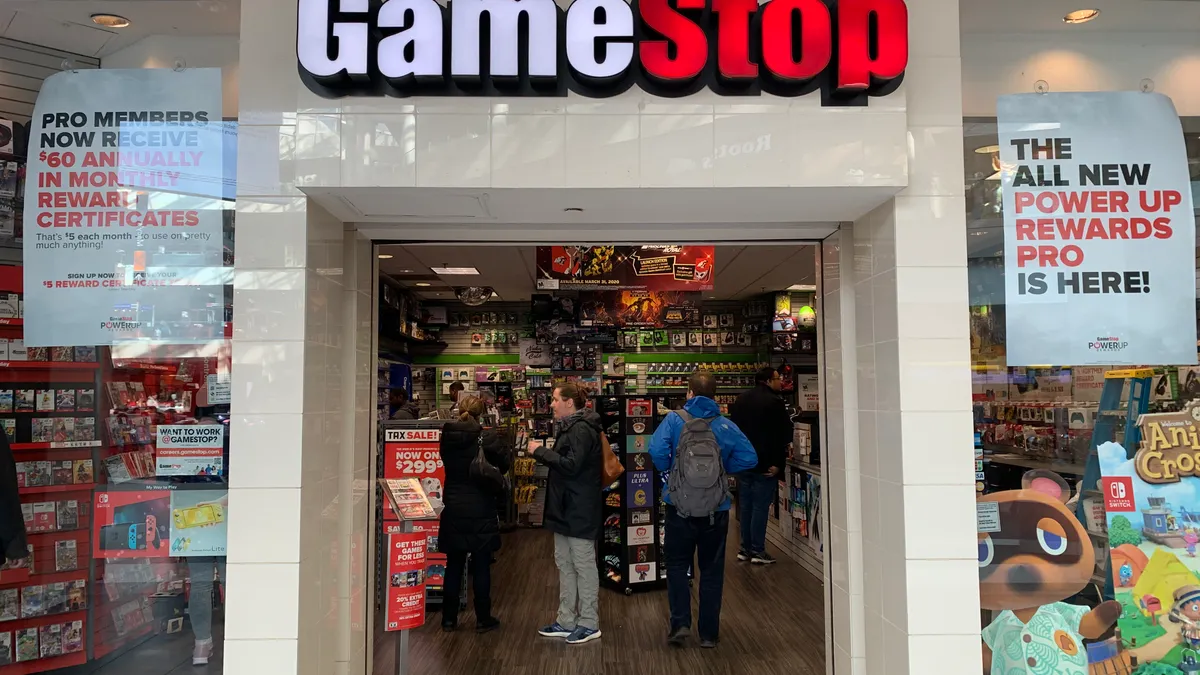UPDATE: April 8, 2021: GameStop's board plans to elect as its chairman Ryan Cohen, the founder and former CEO of Chewy, at its annual meeting of stockholders on June 9. Cohen was recently appointed to the retailer's board after he bought an activist stake in GameStop and began agitating for a swifter digital transformation.
Dive Brief:
- GameStop's board has formed a new strategic committee tasked with "accelerat[ing] the Company's transformation." Already the committee has hired a new chief technology officer and executives to lead customer care and e-commerce fulfillment.
- Chairing the committee is Ryan Cohen, founder and former chief of pet e-commerce giant Chewy, who now sits on GameStop's board after leading an activist shakeup at the retailer. Alan Attal, also a former Chewy executive now on GameStop's board, and Kurt Wolf, another board member, round out the new committee.
- The committee will focus on efforts to turn "GameStop into a technology business and help create enduring value for stockholders" and evaluate "current operational objectives, capital structure and allocation priorities, digital capabilities, organizational footprint, and personnel," the company said in a release.
Dive Insight:
Last year, Cohen's firm took an activist stake in GameStop with the aim of transitioning the gaming retailer, which still operates a brick-and-mortar footprint of more than 5,000 stores, into a tech company.
That is a tall order for a legacy player, though GameStop is in a better position than others that have gone before it, as the last category retailer selling a product increasingly digitized. The retailer's debt — at $485.5 million, including both short term and long term — is manageable and its leases of relatively short duration, which gives it some flexibility as it tries to transform.
Moreover, the retailer has finally reached the end of the tunnel on the latest hardware cycle, after executives blaming dismal 2019 sales on consumers paring back game purchases as they waited for latest generation of consuls from Playstation and Xbox.
The big question for the retailer, as well as Cohen and company, is what does "transformation" at GameStop ultimately look like?
The company has disclosed few details of Cohen's plan. In a November letter, Cohen jabbed at the retailer's leadership for focusing too much on brick-and-mortar retail and not adapting to digital changes in gaming fast enough. Yet Cohen didn't spell out what GameStop's role might be in the gaming sector going forward, as games become more cloud based and production companies can sell their wares straight to a gamer's consul.
Analysts have weighed in on the possibilities. "We expect the traditional retail model to remain to some extent, but will be recast in an omni-channel, experiential form factor," Jefferies analyst Stephanie Wissink wrote in a February note. "We expect greater value to be placed on the activist agenda related to CRM/customer data, [digital] platforms, and partnerships that give [GameStop] access to downstream value from hardware and software sales."
Wissink also suggested that could also build out a "stronger assortment of private label accessories" and "rationalize its consumer goods assortment, with a notable opportunity to digitize a 1P/3P/resale model for gamers & fans."
It's plain enough that GameStop has to try something, after a growing string of disappointing sales periods. COVID-19 added urgency to its turnaround efforts, as government orders and consumer wariness amid the pandemic dragged down foot traffic and sales. Early this year traffic remained down by double digits, even after exuberant traders sent its stock shot up to dizzying highs.
















